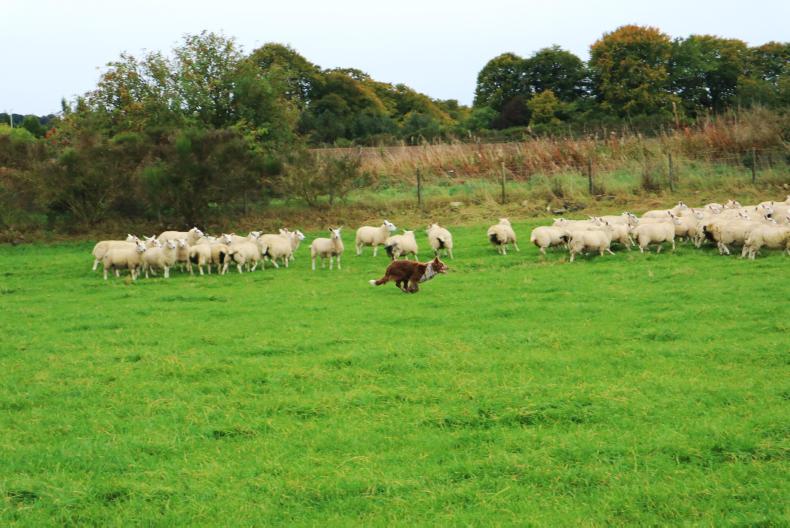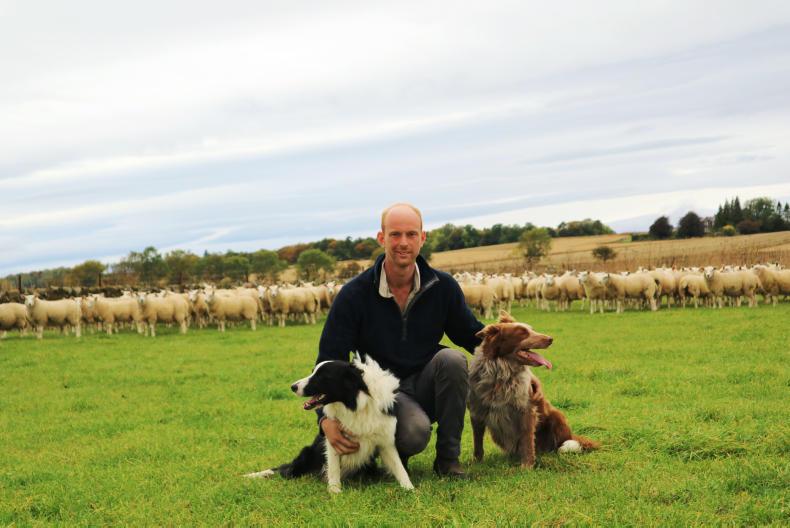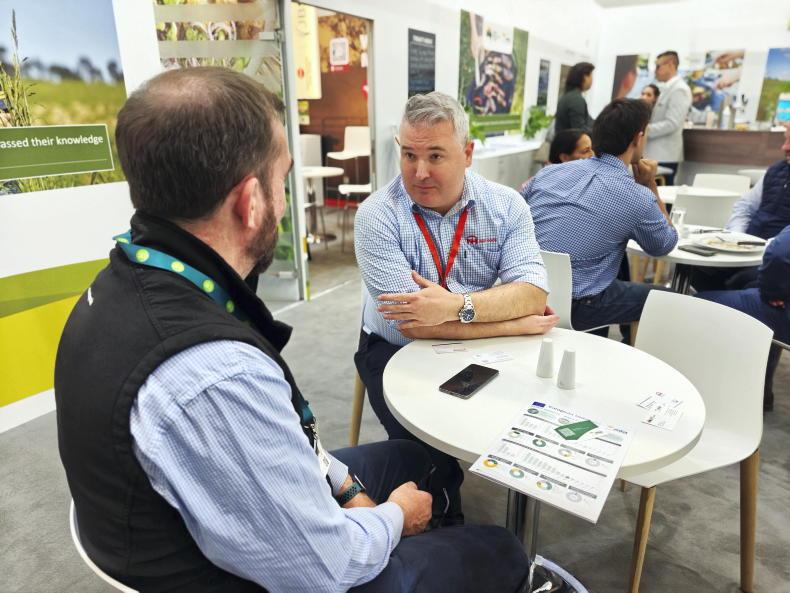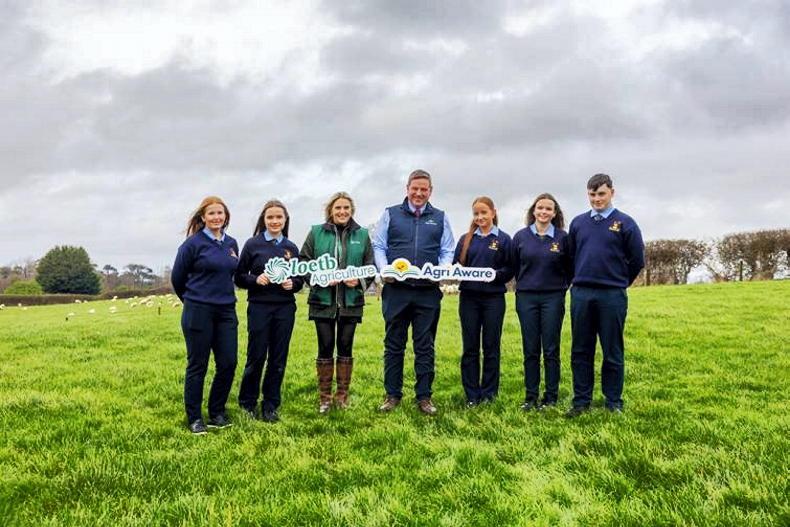Stewart Lawrie is the fifth generation on his home farm, Hillhead of Careston, near Brechin. He farms 1,300ac along with his father and uncle. The family manage a mixed farming system comprising of 1,100 ewes and 110 cows. The mixed farm also grows spring barley, winter barley, winter wheat, spring oats and forage crops including kale and swedes for the cattle.
The herd consists of Limousin and Simmental cattle which are all spring-calving and the flock is made up of Texel and Cheviot ewes.
Stewart and his family finish all their own stock and breed their own replacements on the farm including tups. Stewart is also share-farming a 550-acre hill farm consisting of 550 sheep and 30 cows. Stewart said: “The home farm was going to be under pressure to provide three incomes.
“I saw an ad in the paper about the share farm and took the opportunity. I like having it; it gives a good balance for me because what goes on up there is my own business and my own decisions as opposed to a three-way split.”
Experience is the best education
Stewart left school at 16 and worked for one year before continuing his education by undertaking a HND in agriculture at Scotland’s Rural College (SRUC) in Aberdeen. After college Stewart decided to go travelling. He spent one year in New Zealand and one year in Australia.
“I decided to travel after college. Dad never pressured us to come home as he maintained we had more to learn by working away from home and with other people,” said Stewart.
When I was in Australia they were one week away from deciding not to grow any crops because there had been no rain - I don’t think we will ever experience that here
Spending time on the North and South Islands while in New Zealand, he added: “I spent six months with a silage contractor on the North Island, I then moved to the South Island where I worked with livestock.
“I travelled around with a man who dipped sheep and offered other livestock handling services. There was also a large farm with sheep and cattle where we did a lot of work.”
After New Zealand, it was onto Australia for Stewart where he worked on an arable and sheep farm. Stewart added: “Working in Australia and New Zealand just showed me the scale that is out there. It really gave me perspective. We have heard a lot about the drought here for the last number of months. When I was in Australia they were one week away from deciding not to grow any crops because there had been no rain. I don’t think we will ever experience that here. We have to deal with very few extremes compared to other countries.”
Young Farmer stock judging
Stewart joined the Young Farmers when he came back from his travels in 2013. He quickly got involved with stock judging and won the overall champion in the Young Farmers over-wintering calf competition two years in a row and claimed reserve champion in 2015. He is currently district chair for the competition.
Stewart also completed a term as chair of Brechin Young Farmers Club in 2016 and he noted this gave him great confidence and helped him to become a more outspoken individual.

Gus hard at work rounding up the ewes.
“I was never much good at speaking in front of people but being chair definitely changed that. It’s a great way of meeting people which really helps a lot of young farmers,” he said.
Stewart had always wanted to travel to America but so far he has not gotten the chance. The Agri Affairs tour to California in November will provide the opportunity.
Stewart says travelling in a group will provide a better all-round experience as their time will be used well.
“I think I will definitely take a lot from the trip especially because we are in a group. If you’re by yourself it’s hard to get the most out of these kind of visits. Being in a large group we have told the trip organisers what we want to see,” said Stewart.
“It’s a good time for me to get to see California, I am that bit older and more interested in the technical side of farming.”
With labour being one of the main issues facing Scottish farms Stewart feels it is important to keep learning with the aim of becoming more efficient.
“I definitely see myself taking something away from the trip whether it be simple practices or something bigger. It could come from a berry farm or a sheep farm I don’t know,” Stewart added.
Stewart Lawrie is the fifth generation on his home farm, Hillhead of Careston, near Brechin. He farms 1,300ac along with his father and uncle. The family manage a mixed farming system comprising of 1,100 ewes and 110 cows. The mixed farm also grows spring barley, winter barley, winter wheat, spring oats and forage crops including kale and swedes for the cattle.
The herd consists of Limousin and Simmental cattle which are all spring-calving and the flock is made up of Texel and Cheviot ewes.
Stewart and his family finish all their own stock and breed their own replacements on the farm including tups. Stewart is also share-farming a 550-acre hill farm consisting of 550 sheep and 30 cows. Stewart said: “The home farm was going to be under pressure to provide three incomes.
“I saw an ad in the paper about the share farm and took the opportunity. I like having it; it gives a good balance for me because what goes on up there is my own business and my own decisions as opposed to a three-way split.”
Experience is the best education
Stewart left school at 16 and worked for one year before continuing his education by undertaking a HND in agriculture at Scotland’s Rural College (SRUC) in Aberdeen. After college Stewart decided to go travelling. He spent one year in New Zealand and one year in Australia.
“I decided to travel after college. Dad never pressured us to come home as he maintained we had more to learn by working away from home and with other people,” said Stewart.
When I was in Australia they were one week away from deciding not to grow any crops because there had been no rain - I don’t think we will ever experience that here
Spending time on the North and South Islands while in New Zealand, he added: “I spent six months with a silage contractor on the North Island, I then moved to the South Island where I worked with livestock.
“I travelled around with a man who dipped sheep and offered other livestock handling services. There was also a large farm with sheep and cattle where we did a lot of work.”
After New Zealand, it was onto Australia for Stewart where he worked on an arable and sheep farm. Stewart added: “Working in Australia and New Zealand just showed me the scale that is out there. It really gave me perspective. We have heard a lot about the drought here for the last number of months. When I was in Australia they were one week away from deciding not to grow any crops because there had been no rain. I don’t think we will ever experience that here. We have to deal with very few extremes compared to other countries.”
Young Farmer stock judging
Stewart joined the Young Farmers when he came back from his travels in 2013. He quickly got involved with stock judging and won the overall champion in the Young Farmers over-wintering calf competition two years in a row and claimed reserve champion in 2015. He is currently district chair for the competition.
Stewart also completed a term as chair of Brechin Young Farmers Club in 2016 and he noted this gave him great confidence and helped him to become a more outspoken individual.

Gus hard at work rounding up the ewes.
“I was never much good at speaking in front of people but being chair definitely changed that. It’s a great way of meeting people which really helps a lot of young farmers,” he said.
Stewart had always wanted to travel to America but so far he has not gotten the chance. The Agri Affairs tour to California in November will provide the opportunity.
Stewart says travelling in a group will provide a better all-round experience as their time will be used well.
“I think I will definitely take a lot from the trip especially because we are in a group. If you’re by yourself it’s hard to get the most out of these kind of visits. Being in a large group we have told the trip organisers what we want to see,” said Stewart.
“It’s a good time for me to get to see California, I am that bit older and more interested in the technical side of farming.”
With labour being one of the main issues facing Scottish farms Stewart feels it is important to keep learning with the aim of becoming more efficient.
“I definitely see myself taking something away from the trip whether it be simple practices or something bigger. It could come from a berry farm or a sheep farm I don’t know,” Stewart added.












SHARING OPTIONS